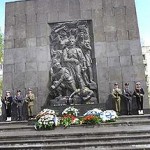Poland Makes Peace With Its Jews
 The last time I saw Krakow was the summer of 1990. Back then, Poland’s history was filled with blank spots where its Jews had been.
The last time I saw Krakow was the summer of 1990. Back then, Poland’s history was filled with blank spots where its Jews had been.
My latest column for The Week looks at Poland's recent efforts to commemorate its Jewish history.
The last time I saw Krakow was the summer of 1990.
Communist power had ended in Poland, but old ways continued. The police still barked orders. The buildings moldered. The air still choked with brown smoke.
It took two decades to make it back. Boy, do I feel like Rip Van Winkle – and not only because this time my wife and I are traveling with a college-age daughter. Horse-drawn carriages clip-clop through the streets behind new BMWs. Michelin stars are affixed to restaurant windows. The house in which Copernicus stayed when he visited Jagellonian University has been converted into a hotel in the Relais & Chateaux chain.
Back then, Poland’s history was filled with blank spots where its Jews had been. I visited the town of Kielce, hometown of my maternal grandfather, where Jews returning from Nazi camps had been attacked by non-Jewish townsfolk who feared the survivors might reclaim stolen homes and property. Old synagogues rotted, or were put to new uses without anyone bothering even to paint over their Hebrew letterings. I would ask older people if they could point out this street or that; seemingly nobody could remember.
Everything is different this time. I don’t think I’ve been anywhere outside Israel where Jewish history is commemorated the way it is here. The row of golf carts in the main square advertise (in English): “Old Town – Jewish Quarter – Oskar Schindler’s Factory.”
Yes, that Oskar Schindler. The former enamel factory celebrated in Stephen Spielberg’s movie has been lovingly restored, transformed into an ingenious museum of Krakow’s wartime history. That’s in addition to the museum inside the city’s oldest synagogue, and the new museum of Jewish life before the war.
Click here to read the rest.